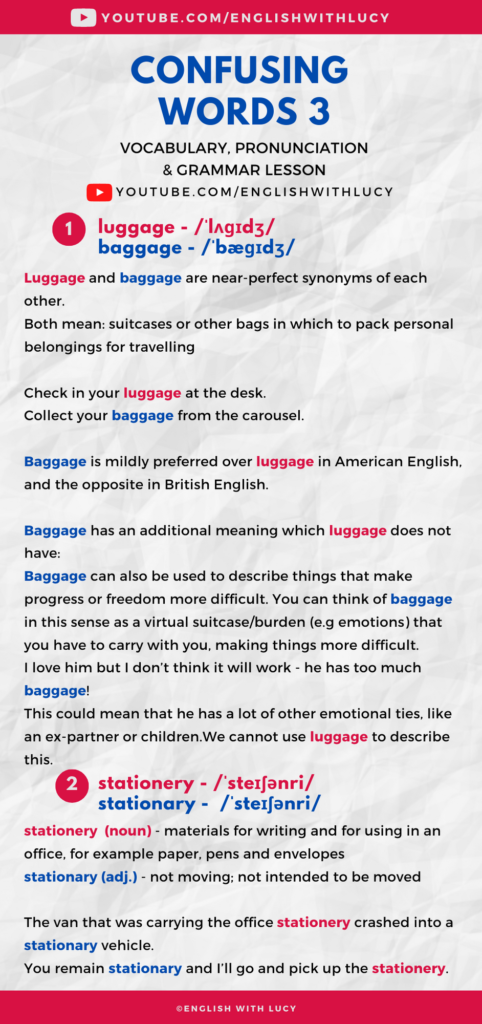
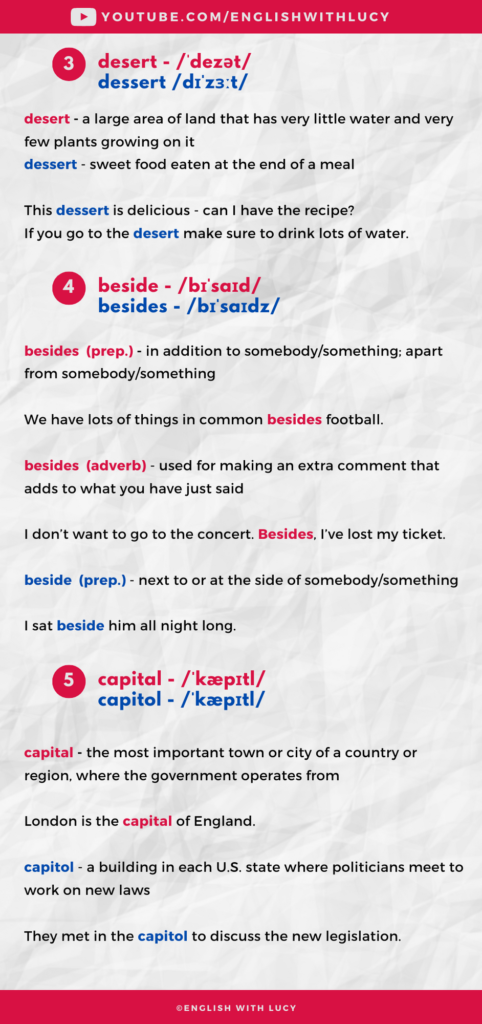
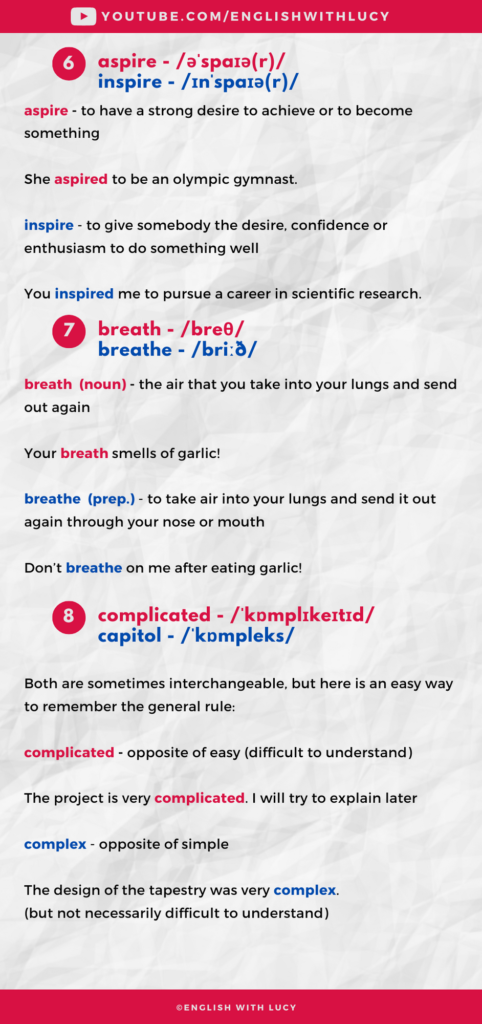
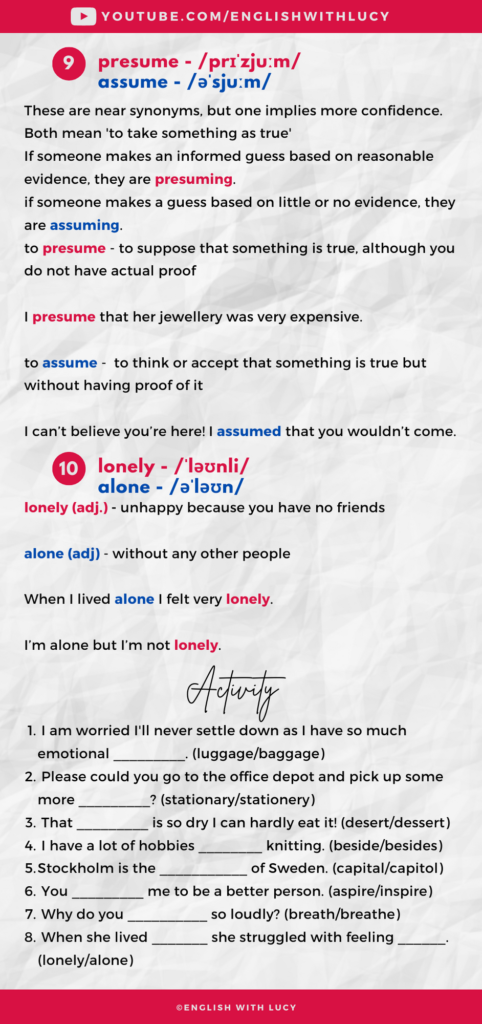
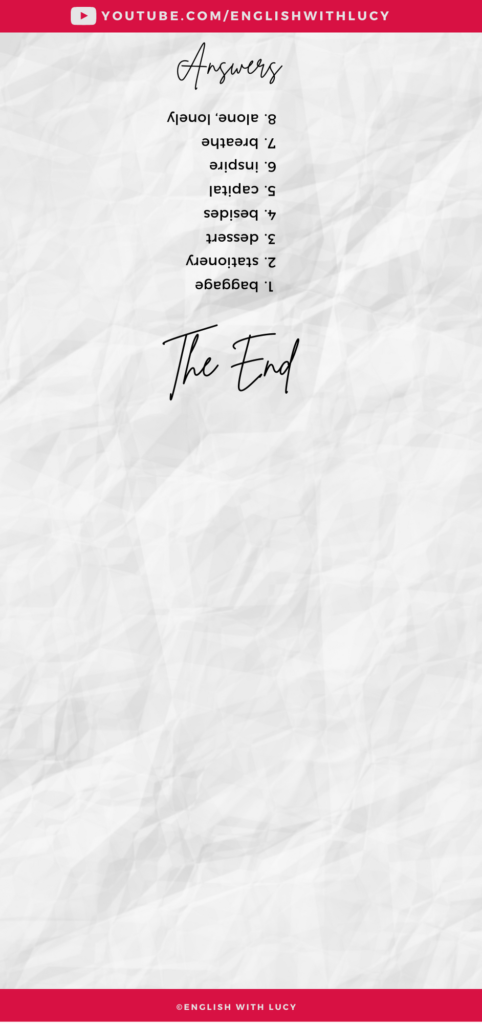
Full Transcript:
Number one, luggage or baggage. So luggage and baggage are quite unusual because they are near perfect synonyms of each other. Both of them mean suitcases or other bags in which to pack your personal belongings for travel. “Check in your luggage at the desk.” “Pick up your baggage from the carousel.” They mean the same thing, however, baggage has several additional meanings, which luggage does not have. There is also a slight preference of baggage in American English and luggage in British English. But this is not enormous. We use both. Baggage can be used to describe things that make progress or freedom more difficult. So it’s kind of saying that you’re carrying around a virtual suitcase with you. It’s much harder to go through life carrying a huge burden, for example, emotional baggage.
If somebody has a lot of emotional issues that they’re carrying around with them, that prevents progress or impedes them. An example, “I love him, but I don’t think it will work. He has too much baggage.” This baggage could mean lots of things. It could mean maybe he has children, maybe he has a difficult ex-partner. You can use your imagination for that one. We can not use luggage for this. It’s only baggage in this case. If I say “He sounds perfect. Does he have any baggage?” I’m not asking if he has any suitcases. I’m asking if he has anything negative, anything he’s carrying with him.
Number two, we have stationary and stationery, both pronounced in the same way, but spelled differently. We have stationary with A-R-Y, which means to not be moving or not intended to be moved. And we have stationary with E-R-Y, which means office supplies basically, files, pencils, envelopes, paper, uncomfortable noun. Have a look at these sentences. When you hear them, you can only tell the difference through context because stationery E-R-Y is a noun and stationary A-R-Y is an adjective. When you see them written down, it’s more clear. The van that was carrying the office stationery crashed into a stationary vehicle. Or, “You remain stationary and I’ll go and pick up the stationery.”
Number three, we have desert and dessert. So they only differ in one extra S in dessert, but the pronunciation is different. The stress is on a different syllable in each desert, dessert. A desert is a large area of land that’s very dry and has no water because it’s dry and very few plants. A dessert is a sweet food eaten typically at the end of a meal. Okay, which spellings am I referring to in these two separate sentences? Number one, have you ever licked a desert? And number two, this desert is dry. Okay. I was just trying to confuse you then. The first one is desert, as in a dry place. Have you ever licked a dry place, a desert? And this dessert pudding, sweet food is dry. That’s valid. A dessert could be very dry. Give yourself a pat on the back if you’ve gotten that right.
Number four, we have beside and besides. So beside is a preposition, meaning next to something. I sat beside him all night long. And besides can be both a preposition and an adverb as well. The preposition means in addition to, or apart from. An example, “We have lots of things in common besides football,” apart from football, in addition to football. Besides as an adverb is used for making an extra comment, which adds to what you have just said. An example, “I don’t want to go to the concert. Besides, I’ve lost my ticket.” That extra comment adds to what I had previously said.
Number five, we have capitol and capital, pronounced in the same way, but with different spellings. So capital with A-L means the most important city in a region or country. For example, London is the capital of England. Capital O-L is a building in each US state. And I think there’s one called the Capitol in Washington as well, which is more specific, where politicians meet to work on new laws. So you can see how they could be confused. An example, “They met in the Capitol to discuss the new legislations.” Capitol O-L could be confused for the capital city. You just have to see it written down, or you need to know the context.
Number six, we have to aspire and to inspire. I like that group of vowels. Ire. Inspire, aspire. Nice. To aspire is to have a strong desire. Ooh, lovely vowel sound. To achieve something or to become something. For example, “She aspired to become an Olympic gymnast.” To inspire is to give someone else the confidence, desire, or enthusiasm to do something well. An example, “You inspired me to pursue a career in scientific research.”
Number seven, we have breath and breathe. So different consonant sound at the end. Breath, breathe. Same mouth shape, same tongue position, but the second one has voice. So breath is the noun and that describes the air that you take into your lungs and then exhale again. An example, “Your breath smells of garlic.” Not what you want to hear. Well, it means you’ve had the opportunity to eat garlic. I love garlic. To breathe, on the other hand is a verb. It describes the same thing, to take into your lungs and to breathe it out again. An example, “Don’t breathe on me after eating garlic.”
Number eight, we have complicated and complex. In many situations, these can be used interchangeably, but sometimes they can’t. And a good way to think of this is that complicated is the opposite of easy, and complex is the opposite of simple. An example, “The project is very complicated. I’ll try and explain it later.” Or complex, “The design of the tapestry is very complex.” It’s not necessarily difficult to understand, it’s just not simple.
Number nine, we have presume and assume. So we have presume with the zzz sound and assume with the ss sound. Zz has voice, ss has no voice. So these are synonyms. Both imply to take something for granted without fully understanding. Both mean to take something as true. But one implies more confidence. So with presume you are making an informed guess based on some sort of evidence. And example, “I presume that her jewellery is expensive. Based on my evidence, I might’ve seen some before, I’m presuming it’s expensive. I don’t know for sure, but I have a good idea. To assume implies less confidence, it means it’s based on little or no evidence. “I can’t believe you’re here. I assumed you wouldn’t come.” I had no evidence for that, I just assumed it. I just supposed it. Now, a way that you can remember this is to say that to assume is to make an ass out of you and me. Ass-u-me, assume. I really like that one.
And number 10, we have lonely and alone. Lonely and alone, they sound very similar, but they have very different meanings. Both are adjectives. Alone means without any other people. If you’re alone, no one else is there. If you are lonely, you are unhappy because no one else is there. So alone has no emotion attached to it, but lonely does. An example, When I lived alone, I felt very lonely.” Or, “I’m alone, but I’m not lonely.”
All right. That is it for today’s lesson. I really hope you enjoyed it and that you learned something.